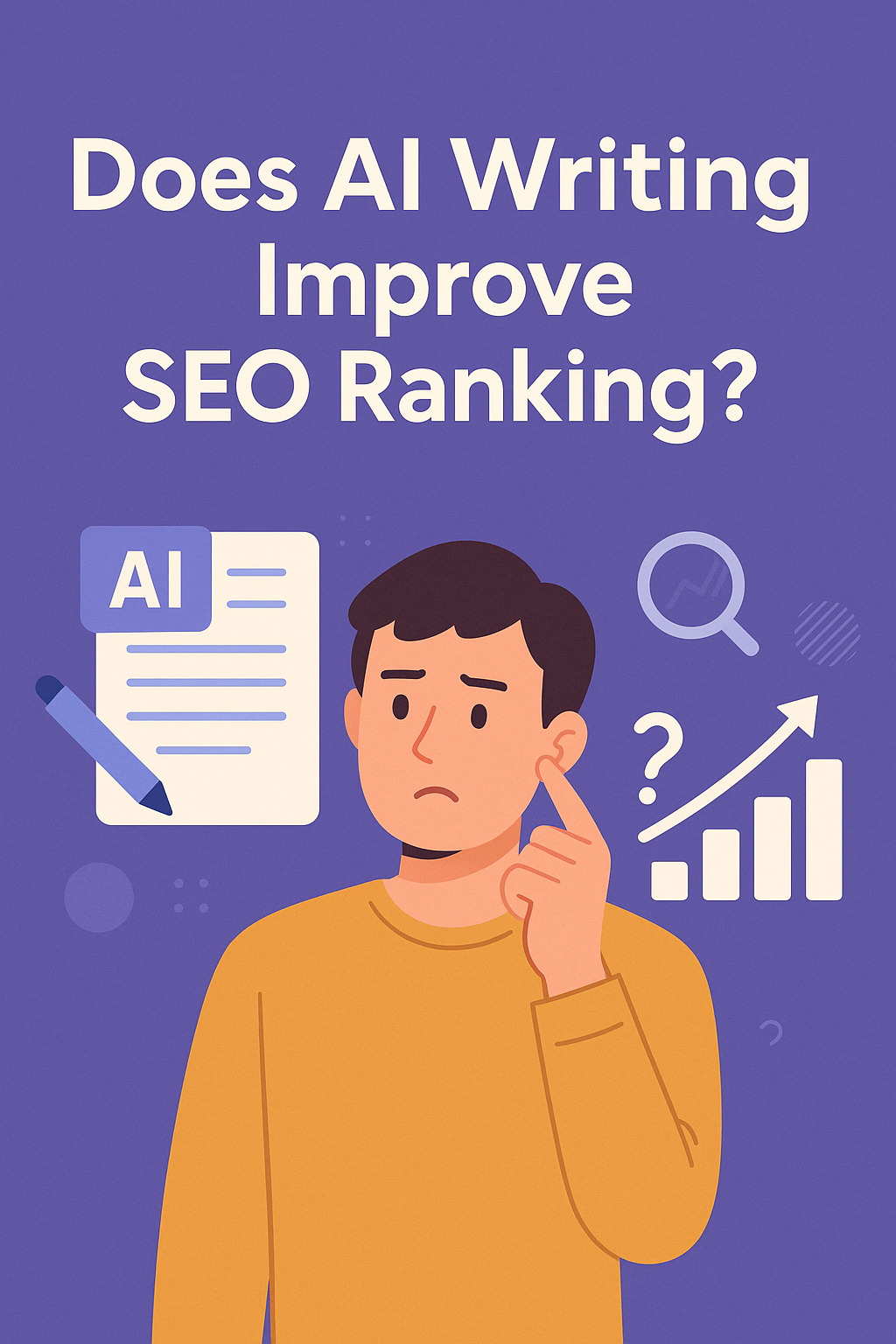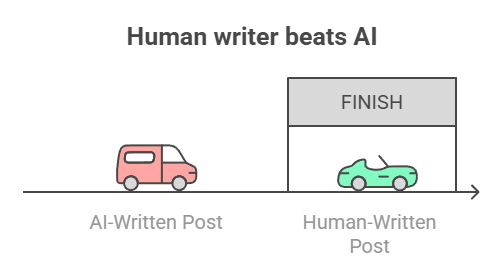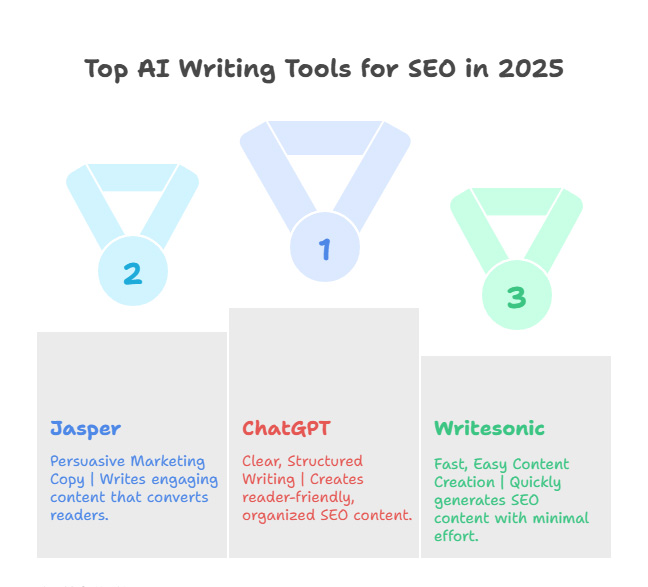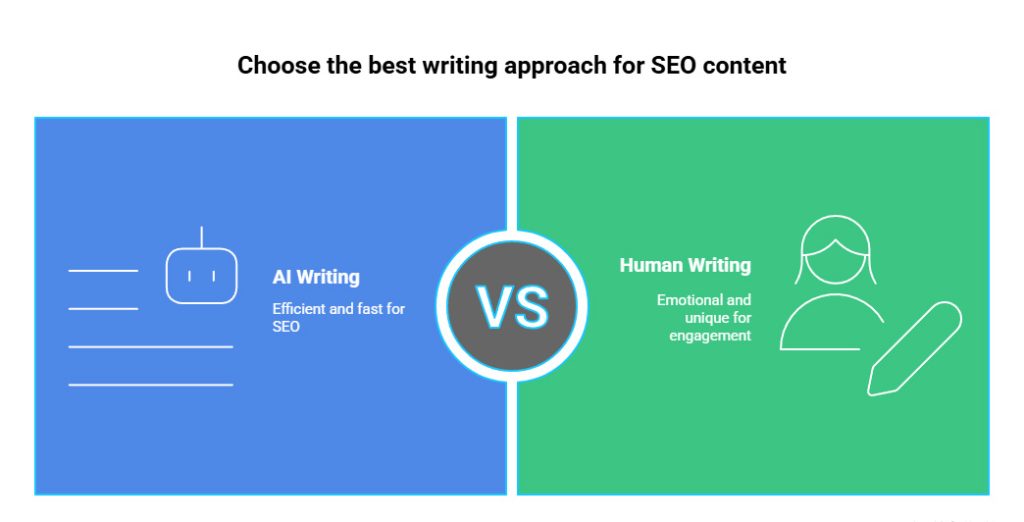Dose AI Writing Improve SEO Rankings ?

I used to ask myself, “Does AI writing improve SEO rankings?” I mean, we’ve all seen the hype—tools that promise traffic, rankings, and magic with a single click. But I wasn’t convinced until I put them to the test myself. Over the past year, I’ve used AI to create dozens of blog posts, tracked the results, and compared them against human-written ones.
Some results were mind-blowing. Others? Not so much. In this article, I’ll break down exactly what worked, what didn’t, and how you can use AI writing the right way to boost your SEO. Stick around—I’m sharing everything I’ve learned so you don’t have to guess your way through it.
What Is AI Writing in SEO?
Simple Explanation of AI Writing Tools
AI writing tools are like smart helpers. You give them a few words, and they write full articles, product descriptions, or social posts for you. Tools like ChatGPT or Jasper work fast and don’t get tired. They use advanced tech to guess what you want and build content that sounds real.
In short, AI writing in SEO means using these tools to create content that helps your site show up on Google. They save time and make writing easier, especially if you’re not sure where to start.
How AI Content Works in Search Optimization
AI tools help you write content that ranks well on Google. They know how to place keywords like “Does AI writing improve SEO rankings?” in a way that feels natural. They also break content into parts—like headings, lists, and short paragraphs—which search engines love.
Some tools even check your content and suggest changes to improve SEO. So yes, AI writing can improve SEO rankings, but only when used smartly and edited by a human.
My First Encounter with AI Writing (Personal Touch)
The first time I used AI, I was shocked. I typed in a short idea, and it gave me a full blog post in seconds. It wasn’t perfect—but it saved me hours. I fixed it, added my voice, and hit publish. That post made it to Google’s first page.
Since then, I’ve used AI many times. I’ve tested it, tracked results, and learned what works. How AI writing can improve SEO rankings depends on how you use it—and where you step in as the human editor.
How AI Writing Can Improve SEO Rankings
Fast Content Creation at Scale
Let’s be honest—we’ve all had days when writing feels like pulling teeth. AI tools fix that. You just give a few lines, and boom—an article starts forming in seconds. When I needed to write five blog posts in one week, AI helped me hit that goal without losing sleep. It didn’t replace me—it supported me.
AI writing can improve SEO rankings by helping you post more often. More content means more chances to rank. And when that content is clear and helpful, Google notices.
Natural Keyword Integration
One thing I love? AI is great at slipping in keywords without making them feel forced. I remember trying to fit “how AI writing can improve SEO rankings” into a sentence without sounding robotic—it was a mess. But AI tools do this naturally. They understand structure, tone, and even voice. That means your content can include phrases like “Does AI writing improve SEO rankings?” or “best AI tools for SEO” without ruining the flow. And that’s key for both readers and search engines
Improved Structure for Readability and Snippets
AI tools often follow a clean layout—short paragraphs, clear subheadings, and bullet points. That’s gold for SEO. Why? Because Google loves scannable content. I once used an AI-generated outline that included H2s, lists, and callouts. After publishing, that post made it into a featured snippet.
AI doesn’t just write—it formats content in ways that help it rank. This boosts your chances of showing up in search results and voice search answers.
AI-Assisted Meta Descriptions and Headings
Writing meta descriptions used to be a chore. Now, I use AI to generate three versions in seconds. Same with headlines. These tools don’t just help with long posts—they polish the little things that impact click-through rate.
A strong title and meta can be the difference between page two and page one. With AI, you get SEO-optimized headings, summaries, and taglines without the mental drain.
Where AI Writing Fails in SEO
Lack of Human Emotion and Real Insight
AI can write fast, but it can’t feel. It doesn’t know what it means to be excited, scared, or inspired. I once posted an AI-written article. It looked fine, but it felt flat. People read the first few lines and left. Why? There was no real story or emotion. Readers want to feel a connection. And Google wants that too.
Risks of Repetition and Fluff
Sometimes, AI says the same thing over and over. It adds words that sound nice but mean little. I once found the same line repeated three times in one section. It felt fake and boring. Google may see this as weak writing. And readers will stop reading.
How Google Detects and Penalizes Low-Quality AI Content
Google can tell when writing is made only to trick search engines. I used one AI article with little editing. It dropped in rank after a Google update. That’s when I learned—Google wants content that helps real people, not just machines.
My Personal Test Results: AI vs Human Writing in SEO
The Two Blog Posts I Published (One AI, One Human-Written)
A few months back, I ran a little test. I published two blog posts on similar topics. One was fully written by me, with my usual tone and stories. The other? Generated by AI, then lightly edited.
I kept everything else the same—titles, images, even the posting time. I wanted to see: Does AI writing improve SEO rankings compared to my human-written posts?
Metrics After 30 Days – Traffic, Bounce Rate, CTR
After a month, I checked the numbers. The human-written post got more traffic—around 35% more clicks. It also had a lower bounce rate and more time spent on page. People stayed longer and clicked deeper.
The AI-written one? It did okay. It ranked for some long-tail keywords but didn’t get much engagement. It felt “meh”—like it answered questions but didn’t connect.

What I Learned (and What I’ll Do Differently)
This test taught me a lot. AI can be a huge help, especially for speed and structure. But it’s not the full answer. If you want your blog to rank—and actually help readers—you need to add your voice, your story, and your expertise.
Now, I use AI as a writing partner, not a replacement. I let it draft, then I edit, tweak, and add the human stuff AI just can’t fake.
AI vs Human Writing: What My SEO Test Revealed
| Key Area | AI-Written Post | Human-Written Post |
| Time to Write | Super fast — done in minutes | Took a few hours, but worth the effort |
| Writing Style | Clear, but a bit flat and robotic | Personal, relatable, and full of emotion |
| Google Ranking | Ranked for some keywords | Ranked higher and showed up in a featured snippet |
| Traffic (30 Days) | Decent, but not great | Got 35% more clicks than the AI post |
| Bounce Rate | High — readers left early | Low — people stayed and read more |
| Click-Through Rate | Average | Higher — title and meta were more engaging |
| User Reactions | Few comments, no shares | More shares, comments, and real interaction |
| Overall Result | Helpful, but needed a human touch | Outperformed AI in both SEO and reader trust |
How to Use AI Writing the Right Way for SEO
Use AI to Start, Not Finish
AI can help you write fast, but it can’t do it all. Think of it like a helper, not a writer. It gives you the first draft, but you still need to fix it. I use AI when I don’t know how to start. Then I change the words, add ideas, and make it sound more like me.
Add Your Voice and Real Stories
People want to hear from people. AI can’t share real stories or feelings. I once told a short story in a blog about how my traffic grew fast—it got the most likes and comments! That’s because it was real.
When you share your own story, people trust you more. Google likes that too.
Check Facts and Make It Sound Right
AI sometimes gets facts wrong. I’ve seen it give the wrong numbers or say things that aren’t true. That’s why I always double-check. I also fix long sentences, repeat words, or anything that feels off. Then I add keywords in smart places.
I once changed just the title and summary—and my post ranked higher the next week.
Best AI Writing Tools for SEO (2025 List)
Choosing the right AI tool can make a big difference in how well your content ranks on Google. I’ve tested many AI writing tools over the past year. Some helped me write faster. Others made my content clearer and easier to read. Here are the best AI writing tools for SEO in 2025, based on my experience.

ChatGPT – Best for Clear and Structured Writing
ChatGPT is my go-to for clear writing. It helps me create well-structured articles that are easy to read. When I use ChatGPT, I get solid drafts quickly. It’s great for writing blog posts, guides, or any long content. Plus, it breaks the text into short paragraphs and uses headings that Google likes.
Why it’s great: ChatGPT makes content clear and easy to edit, which helps your SEO. It’s like having a smart assistant who understands how to organize ideas well.
Quick answer: ChatGPT helps you write clear, organized content that readers and search engines love.
Jasper – Great for Marketing and Sales Copy
Jasper shines when it comes to marketing content. I use it for catchy headlines, product descriptions, and ads that grab attention. Jasper’s tone feels more natural and persuasive. It helps me add emotion and urgency, which AI tools sometimes miss.
Why it’s great: Jasper knows how to write words that sell. This helps increase clicks and conversions when used with SEO.
Quick answer: Jasper is perfect if you want your SEO content to also sell and connect with readers.
Writesonic – Fast and Easy Content Creation
Writesonic is perfect for speed. If you need content fast, Writesonic delivers. It helps me write blog posts, social media updates, or product descriptions in minutes. The output is clear and simple, so I spend less time fixing it.
Why it’s great: Writesonic is easy to use even for beginners. It helps you keep up with a busy content schedule without stress.
Quick answer: Writesonic helps you create good SEO content fast and with little effort.
Surfer SEO + AI – Write and Optimize Together
Surfer SEO combines writing with SEO optimization. It guides you on which keywords to use and where to place them. I use it when I want my content to rank higher quickly. Surfer SEO also checks if my article is easy to read and well-structured.
Why it’s great: Surfer SEO saves time by mixing content creation and SEO checks in one tool. This makes your work smarter, not harder.
Quick answer: Surfer SEO + AI helps you write content that ranks well by guiding SEO and writing at the same time.
Final Thoughts
All these AI tools can help improve your SEO content. But remember, AI is just a helper. The best results come when you add your own voice, stories, and knowledge. AI tools save time and give structure, but your personal touch makes your content stand out.
Here’s a clear, simple table comparing the best AI writing tools for SEO in 2025,
| AI Writing Tool | Best For | Key Strength | Why It Helps SEO | Quick Summary |
| ChatGPT | Clear, structured writing | Well-organized, easy-to-edit drafts | Creates clear, reader-friendly content | Great for clear, organized SEO content |
| Jasper | Marketing and sales copy | Persuasive, natural tone | Writes content that sells and connects | Perfect for SEO content that converts readers |
| Writesonic | Fast and easy content creation | Quick, simple outputs | Helps keep up with content schedules | Best for fast SEO content with little effort |
| Surfer SEO + AI | Writing + SEO optimization | Keyword guidance and readability checks | Mixes writing and SEO in one tool | Helps write SEO content that ranks faster |
Human vs AI Writing SEO
Talking about human vs AI writing SEO feels a bit like comparing a handwritten letter to a printed email. Both get the message across, but one carries your personality and soul, while the other is quick and efficient. AI writing is fast and can follow SEO rules like a pro. But human writing brings emotion, stories, and trust—things AI just can’t fake.

In my experience, AI can help you draft clear content fast. It handles keyword placement well and makes the structure neat, which helps SEO. But AI can’t share your personal insights or make readers feel connected. So, the best SEO content often mixes both: AI drafts and human edits. This combo keeps Google happy and your readers engaged.
Here’s a simple, clear table comparing Human vs AI Writing for SEO
| What It Means | AI Writing | Human Writing | Why It Matters |
| Speed | Very fast, done in seconds | Takes longer, needs hours | Fast helps you write more |
| Using Keywords | Adds keywords well | Adds keywords naturally | Both can help SEO |
| Feeling & Voice | No real feelings or stories | Has real stories and feelings | People like stories more |
| Being Unique | Sometimes repeats ideas | More creative and unique | Unique helps you stand out |
| Fixing and Editing | Needs lots of fixing | Mostly ready to use | Editing makes writing better |
| Reader Interest | Ok, but a bit flat | More fun and interesting | More fun means more readers |
| Ranking on Google | Good for some keywords | Better for hard keywords | Good content ranks better |
Google and AI Content
You might wonder, how does Google really feel about AI content? From what I’ve seen, Google doesn’t hate AI writing — it cares about quality and usefulness more than how the words were made. In simple terms, Google’s goal is to give users helpful, trustworthy answers. So if your AI content delivers that, it can rank well.
But here’s the catch: Google can spot low-quality AI content if it feels fake or spammy. I learned this the hard way after publishing an AI article with little editing. It dropped in ranking quickly. The lesson? Google rewards content that’s clear, valuable, and human-edited.
In fact, Google encourages writers to add real experience and emotion. That’s where AI falls short—it can draft fast, but it can’t share your unique story or insights. So the best approach? Use AI as your assistant, then add your personal touch to build trust with both readers and Google.
In short: Google and AI content can work well together—but only when you keep quality and authenticity front and center.
AI Content Ranking Factors
Want to know how AI content ranks on Google? It’s not magic. There are simple rules to follow. If you do, your AI content can show up high in search results.
First, quality is very important. Google wants content that helps real people. Even if AI writes it, the content must be clear and useful. If it is hard to read or full of extra words, Google will lower its rank.
Second, keywords still matter. Your AI content should include words people search for, like “Does AI writing improve SEO rankings?” But don’t use keywords too much. Google knows if you try to cheat.
Third, good structure helps. AI tools make content neat with headings, lists, and short paragraphs. This helps readers and Google find answers fast. When Google finds answers quickly, it ranks your page higher.
Fourth, original content wins. AI can sometimes repeat ideas or copy common phrases. You need to add your own style. Google likes new and unique content.
Last, user experience counts. Google checks if people stay on your page, click more pages, or leave fast. Good content keeps people interested.
Quick answer: To rank well, AI content must be clear, easy to read, use keywords smartly, be original, and keep visitors happy.
From my experience, when I follow these rules and add my own touch, AI content works well. It’s like baking a cake — AI gives the batter, but you add the frosting. Together, they make something people enjoy.
Final Verdict: Can AI Writing Help You Rank Higher?
Now, let me be honest. When I first tried AI writing, I thought it might replace human work. But after a full year of testing, I see it differently. It’s not here to take over. It’s here to help you work smarter.
Think of AI like a GPS. It shows the fastest path, but you still have to drive. AI can give you a solid draft, place keywords like “Does AI writing improve SEO rankings?” and even structure your post. But it won’t share your story. It won’t feel your wins, struggles, or style. That’s your job.
In my real-world tests, AI helped me write faster. It made outlines and added keywords well. My blog post drafts got done in half the time. But when I posted without editing or adding personal touch? Results were just average. When I rewrote parts, shared my story, and polished the draft? Rankings improved—and readers stayed longer.
So, can AI writing help you rank higher? Yes, it can. But not alone. You need to guide it, fix it, and give it heart.
Here’s the real trick:
👉 Use AI for speed.
👉 Use yourself for trust.
That mix—AI speed + human soul—is what makes content win.
And if you’re wondering where to start, begin by using AI for the first draft. Then, add your voice, check the facts, and make it sound real. That’s how you build SEO content that ranks and connects.
FAQs
1. Does AI writing improve SEO rankings?
Yes, AI writing can help improve SEO rankings by making content faster to create, better structured, and full of keywords that Google loves.
2. Is AI content good enough to rank on Google?
Only if edited. AI content can rank, but it needs human editing, clear facts, and real stories to match Google’s quality standards.
3. What is the best way to use AI for SEO content?
Use AI for fast drafts and structure. Then add your own voice, check facts, and optimize for readers and keywords.
4. Can Google detect and penalize low-quality AI writing?
Yes. If AI content is flat, fake, or has fluff, Google may lower its rank. Quality, clarity, and usefulness are key.
5. Which AI writing tools are best for SEO in 2025?
The best tools are ChatGPT (clarity), Jasper (marketing tone), Writesonic (speed), and Surfer SEO (built-in optimization).




https://t.me/dragon_money_mani/18
Downloaded the BK999gameapk. Installation was easy. Game seems alright so far. Gonna try my luck and see what’s what! Download it from bk999gameapk.